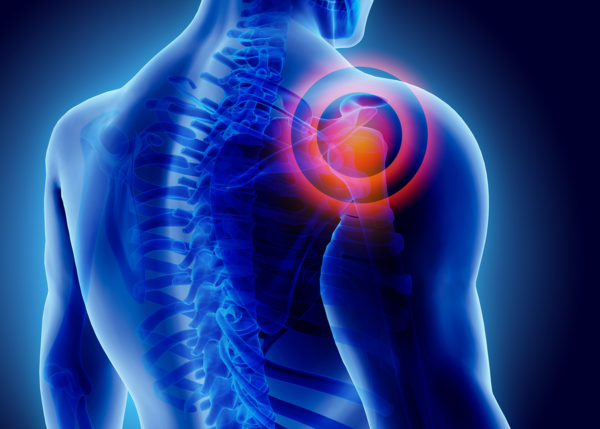A rotator cuff tear is a common and serious injury. To fully recover from this type of injury it is vital to go through proper rehabilitation. The goal is to strengthen these muscles while not overworking them. Due to the complicated nature of the shoulder joint, it is best to seek the help of a professional when working through your rehabilitation.
The Rotator Cuff Muscles
First, it is important to understand what this injury is, so you know how it will be treated.
The anatomy of your shoulder looks like this; the ball of your shoulder sits in a very shallow socket created by your shoulder blade and collar bone. Holding this ball into the socket and keeping it stable are four muscles called the "rotator cuff". This rotator cuff is made up of the supraspinatus, infraspinatus, teres minor, and subscapularis. These muscles provide stability while also allowing for a wide range of mobility.
If you have a "tear" of the rotator cuff then you have torn through one or more of these muscles or tendons. Each person is different but some of the typical signs and symptoms of a rotator cuff tear are as follows:
First would be pain. You should not have shoulder pain as it is not normal and should not be ignored. It warns you that there is something wrong and will continue to get worse unless addressed. Although pain is present, it doesn't always mean that a tear is present as well. A muscle or tendon strain, tendonitis, or bicep issue could also be the culprit. However, these issues can lead to tears in your rotator cuff if left untreated, so be sure not to overwork with pain.
Swelling can also be present with a rotator cuff tear, so if your shoulder is swollen, you should seek medical attention. Another sign would be a loss of motion. If you are unable to raise your arm as high as you were before the pain, then chances are there could be something wrong.
Important Notes
When recovering from this type of injury, you are trying to strengthen these muscles while not over stressing them. You will also be working on regaining as much range of motion as possible. These two factors will make this unlike any workout you have had before. You are not working on building big muscles, like in a regular workout, but working toward stability and flexibility.
You should always consult your doctor or physical therapist about any shoulder injury that you may have. It is your therapist's job to put you through a routine that is suited best for you. It is very important to realize that going beyond what is recommended could hinder your recovery time or worsen your injury in general.
When you begin rehabbing you shoulder, you will most likely begin working with light weights because you are now focused on stability and flexibility. This will cause less fatigue then you may be used to with regular workout. That is OK! The goal is to strengthen, stabilize and regain motion without overdoing it with heavy weight and pain. Each exercise will have a specific amount of repetitions that you will go through. Consult with your therapist regarding these repetitions and exercises.
Keep These in Mind
There are a few important things to keep in mind when working out your shoulder:
- Don't overdo it with heavy weights. You do not want to lift something that your shoulder isn't able to handle. Make sure to consult your therapist.
- Important to warm up the shoulder before beginning strength training. Follow your therapist's specific warm up routine.
- Don't get frustrated during these workouts. These injuries take time to heal and it will take time to return to previous form.
- Ice will help after workouts to reduce swelling and help your shoulder heal properly.
- Make sure to give your shoulder the rest it needs. Don't overdo it with unnecessary activity. Avoid any sports or strenuous activity until you are fully healed. If you are unsure, consult your therapist.
- If you are looking for a more intense workout, you are still able to work lower body. Just be sure to avoid stress to the shoulder as your therapist recommends.
Injured rotator cuffs are serious injuries, but it's not one that you can't recover from with the right therapy and pace. Remember, shoulder rehabilitation takes time and it is important to give your shoulder the proper time it needs. Always consult your doctor or therapist before trying anything on your own, because the last thing you want is to make things worse for yourself.
Our locations:
- Kennedy: (412)-771-1055
- Crafton: (412)-458-3445
- Allison Park: (412)-487-2787
- Bethel Park: (412) 835-2626
- Atlasburg: (724) 947-9999
Website: www.hesspt.com
Disclaimer: this information is "not medical advice" and is used at the site visitor's own risk.
